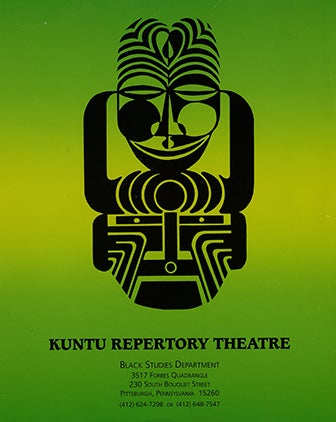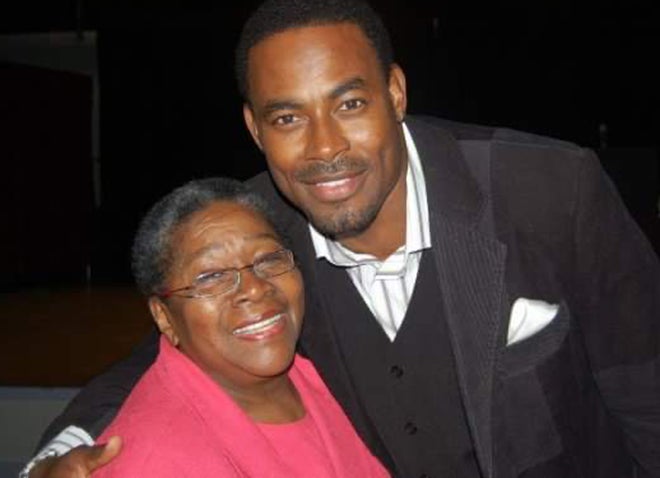
Subscribe to Pittwire Today
Get the most interesting and important stories from the University of Pittsburgh.Vernell A. Lillie, who brought excellence to Black theater, died at 89

Oronde Sharif remembers meeting Vernell A. Lillie when he was 10. He and his brother were always in tow when his busy mother Shona, a choreographer, dancer and Pitt lecturer, was out and about at meetings and events. Lillie, a former associate professor of Africana Studies and founder of Pitt’s Kuntu Repertory Theatre, was a close friend of Shona’s.
Years later, when Sharif was an undergraduate student at Pitt, he found himself in Lillie’s office more often than his mother’s.
“I would go there just to talk,” said Sharif, who is now director of Pitt’s Shona Sharif African Drum and Dance Ensemble, part of Africana Studies. “And not about acting … we talked about student life. Dr. Lillie was like that mother, grandmother or mentor who had so much knowledge.”
Lillie, who retired from Pitt in 2006, died on May 11, her 89th birthday.
Born in 1931 in Hempstead, Texas, Lillie arrived in Pittsburgh in 1969 to pursue a doctorate at Carnegie Mellon University. In 1973, she began teaching in what was then Pitt’s Department of Black Community, Education, and Research and, along with prolific poet and playwright Rob Penny, founded Kuntu the following year. The new theater company exposed Pittsburgh audiences to cutting edge ideas, art, culture and the Black community’s social and political concerns. For nearly four decades, it featured works by Penny, Pulitzer Prize-winning Pittsburgh native August Wilson and other Black playwrights. The Black Arts Movement was thriving in cities like Atlanta, Detroit, Chicago and Pittsburgh, and Lillie and her peers were in the forefront.
Kuntu was the first company to mount the August Wilson play “Homecoming” in 1976, which Lillie directed. Actors such as Sala Udin, Emmy-winner Esther Rolle and Pittsburgh Playwrights Theater Company founder Mark Southers, performed on the Kuntu stage, located at Pitt’s Stephen Foster Memorial, and later at Alumni Hall. Chadwick Boseman of “Black Panther” fame also had a play staged by Kuntu and acted in it.
Sharif remembers Lillie, along with people like Shona, Penny and former department chair Barbara Sizemore as providing the depth, soul and energy to that corner of campus. Students would hang out in their offices, listening to advice and absorbing like sponges.
Many of Sharif’s friends were actors and some say that studying under Lillie was the highlight of their Pitt experience. Sharif enjoyed watching the Kuntu rehearsals and always stayed late after a final performance to help strike the set, just to be of help to Lillie.
“I just gravitated to her,” he said.
Sala Udin, who acted in Kuntu plays and eventually served on Pittsburgh City Council for 10 years, said Lillie was “a serious taskmaster” of a director, compared to others. And she was all about educating her audience.
“She integrated teaching into her directing,” he said. “She was always serious about people have an intellectual curiosity and an understanding of Black theatre.”
Lillie was known for opening up Kuntu to community members and non-theater majors. Even those who lacked acting experience were welcome to audition for one of the plays, which often used music and African themes to bring stories of Black life to its audiences.
Pitt Professor of History Laurence Glasco, whose career at Pitt started around the time Lillie arrived, says he was always impressed by the quality of the Kuntu performances, including many works by Penny, whom Lillie liked to showcase.
“I found a lot of human interest in the plays, though they had a political message,” he said. “Vernell had an orientation in Black consciousness and Black Power but it didn’t overwhelm the work or make it one-dimensional at all.”
Glasco also enjoyed the “talk-back sessions” Lillie offered at the end of a performance, in which the cast would return to the stage and engage with audience members.
While he was a Duquesne University student, actor Lamman Rucker was in the cast of Penny’s play “Nefertari Rising” and Lillie made an indelible impression on him. As she did often, Lillie brought in a guest director, this time Woodie King Jr., the founding director of the New Federal Theatre in the lower east side of Manhattan. The experience inspired Rucker to move to New York to work with King.
“There’s so much excellence that you see on stage, Broadway, screen and through regional theater, it leads back to Dr. Lillie’s leadership,” he said. “So much of what I say and do has come from her, especially while training artists now.”
Rucker, who has appeared in Tyler Perry films and on the popular “Law & Order” TV series, said Lillie inspired him to establish The Black Gents of Hollywood, a Black male artist’s collective.
“Now that she’s an ancestral spirit, she’ll continue to guide me,” he said.
Lillie’s robust career at Pitt garnered her many awards, including the Chancellor’s Distinguished Teaching Award in 1986, a Distinguished Daughter of Pennsylvania in 1998 and the Pennsylvania Creative Community Award in 2006. A scholarship in Lillie’s name was established at Dillard University in New Orleans, her alma mater. She kept Kuntu alive even after her retirement. The company’s final performances were at the Homewood Library in 2013. But Sharif, Udin and the others feel her presence will stay with them.
Said Rucker: “She breathed life into me and so many people. Her work, vigor and love for us will continue to pour through us forever.“
Preserving Kuntu History
A treasure trove of items and correspondence related to Kuntu Repertory Theatre’s 40-year journey at Pitt is being catalogued at the University Library System. Donated in 2015 by the family of Vernell A. Lillie and facilitated by the Kuntu staff and board of directors, the items filled 500 boxes when they arrived at the University Library System’s Ford E. and Harriet R. Curtis Theatre Collection.
Project archivist Megan Massanelli said the archives are being separated into two collections—the Dr. Vernell A Lillie Papers and the Kuntu Repertory Theatre Records. She says the boxes contained several hundred audio and video recordings, and a special grant came through last fall to help the library preserve and digitize them, including recordings from the Bob Johnson Papers.
The Lillie Papers will include syllabi for classes, personal research materials, academic records, department correspondence and personal letters, photos and school yearbooks. Materials cover the years 1950 through 2013. The Kuntu Records will contain written, audio and photographic records documenting the history and activities of Kuntu Repertory Theatre.
“Kuntu was the predominant Black performing arts group in Pittsburgh for more than 35 years,” said Massanelli. “It provided a platform for Black artists and technicians and examined the Black experience with the goal of creating personal growth and social change.”



